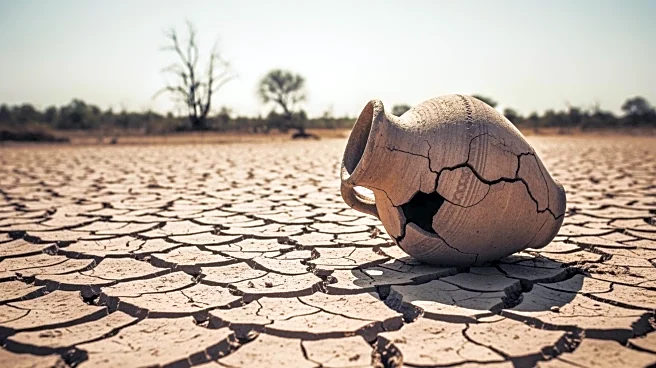What's Happening?
Iran is experiencing a severe environmental crisis characterized by water shortages, energy rationing, and worsening air pollution. Tehran, along with five other major cities, is engulfed in smog due to stagnant weather conditions trapping pollution. The
crisis has led to significant public frustration and periodic unrest, particularly in areas hardest hit by drought and declining services. Iranian President Masoud Pezeshkian has suggested relocating the capital to alleviate overcrowding and ecological strain. The crisis is exacerbated by industrial emissions, heavy traffic, and the burning of low-quality fuels, contributing to air pollution that claims approximately 161 lives per day.
Why It's Important?
The environmental challenges in Iran have significant implications for the country and the broader Middle East region. Diminishing water reserves and recurring pollution episodes are affecting agricultural output, raising concerns about food security. The crisis highlights the vulnerabilities of climate-stressed states and underscores the need for systemic reforms in transport, fuel quality, energy capacity, and water infrastructure. Without these reforms, major cities like Tehran may continue to face hazardous air spikes, water rationing, and mounting health, economic, and social pressures.
What's Next?
Iran's environmental crises are interconnected, requiring comprehensive reforms to address the issues. Potential next steps include modernizing transport systems, improving fuel quality, expanding energy capacity, and upgrading water infrastructure. These measures are crucial to prevent repeated hazardous air spikes and water shortages. The government may also consider relocating the capital to reduce ecological strain. Stakeholders, including political leaders and civil society groups, are likely to push for urgent action to mitigate the crisis.
Beyond the Headlines
The environmental crisis in Iran poses ethical and political challenges, as it affects public health and economic stability. The government's response to the crisis will be critical in determining the country's future resilience to environmental stressors. The situation also highlights the broader issue of climate change and its impact on vulnerable regions, emphasizing the need for international cooperation and support.


















